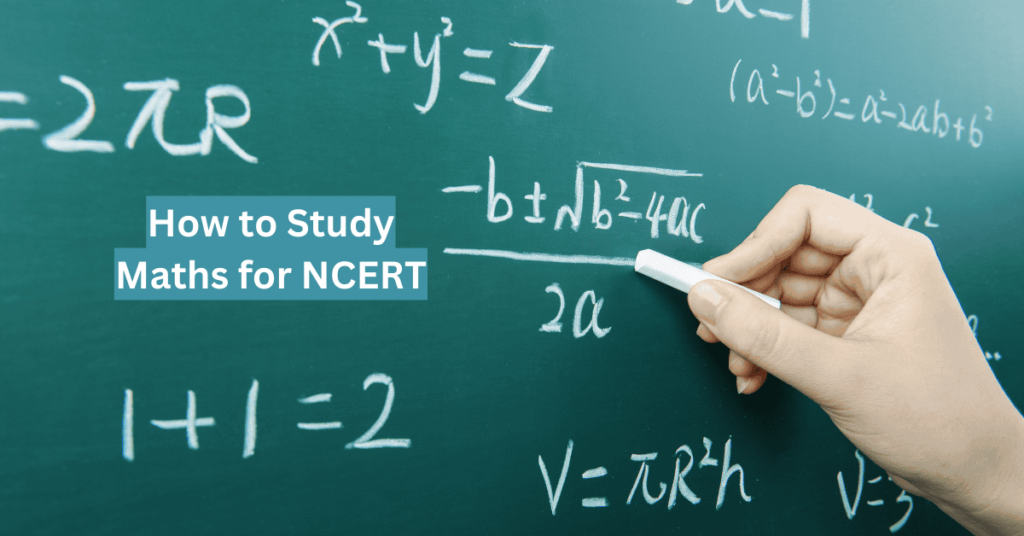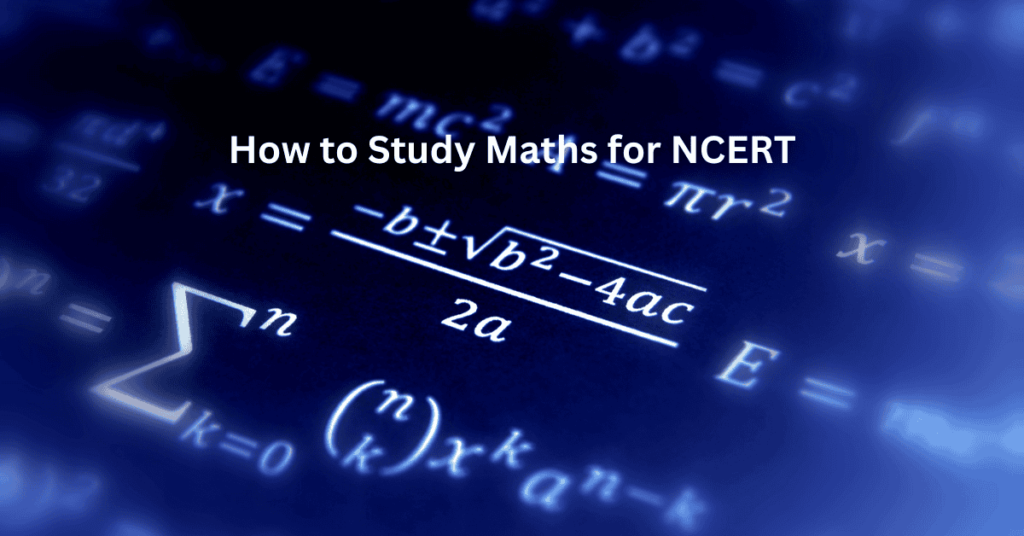How to Study Maths for NCERT: Ultimate Guide for Success
How to Study Maths for NCERT: A Comprehensive Guide
Mathematics is often perceived as a challenging subject, but with the right approach and strategies, it can become one of the most enjoyable and rewarding subjects. For students preparing for competitive exams, a solid understanding of NCERT Maths is crucial as it forms the foundation for many higher-level concepts. In this comprehensive guide, we’ll explore effective techniques and strategies to study Maths for NCERT, ensuring you build a strong conceptual base and perform well in exams.


Understanding the Importance of NCERT Maths
NCERT (National Council of Educational Research and Training) textbooks are designed to provide a clear and thorough understanding of fundamental concepts in various subjects, including Mathematics. These books are particularly important because:
- Conceptual Clarity: NCERT books focus on building a strong conceptual foundation, which is essential for solving complex problems in competitive exams.
- Alignment with Exam Syllabus: Most competitive exams in India, including JEE, NEET, and various state-level exams, have their syllabus aligned with the NCERT curriculum.
- Quality of Problems: The exercises and examples in NCERT books are curated to enhance analytical and problem-solving skills.
Effective Strategies to Study Maths for NCERT
1. Develop a Positive Attitude Towards Maths
The first step to mastering Maths is to develop a positive attitude towards the subject. Instead of viewing it as a difficult subject, see it as a series of puzzles waiting to be solved. Your mindset can significantly influence your ability to learn and retain mathematical concepts.
2. Understand the Syllabus
Before diving into studying, familiarize yourself with the NCERT Maths syllabus. Knowing the topics and sub-topics will help you create a structured study plan. Here’s a brief overview of the key areas you need to focus on:
- Algebra
- Trigonometry
- Geometry
- Calculus
- Probability and Statistics
- Coordinate Geometry
3. Create a Study Schedule
Consistency is key when it comes to studying Maths. Create a study schedule that allocates specific time slots for different topics. Ensure that you:
- Study daily to keep concepts fresh in your mind.
- Allocate more time to challenging topics.
- Include time for revision and practice.
4. Focus on Understanding Concepts
Rather than rote memorization, focus on understanding the underlying concepts. Here are some tips to achieve conceptual clarity:
- Read the Theory: Start by thoroughly reading the theory and examples in the NCERT book.
- Visualize Problems: Try to visualize problems, especially in Geometry and Coordinate Geometry, to get a better understanding.
- Use Real-life Analogies: Relate mathematical concepts to real-life situations to grasp them better.
5. Practice Regularly
Mathematics is a subject that requires regular practice. Here’s how you can effectively practice:
- Solve NCERT Exercises: Start by solving the exercises given at the end of each chapter. Ensure you solve each problem and understand the solution.
- Attempt Miscellaneous Exercises: NCERT books often include miscellaneous exercises that combine multiple concepts. These are excellent for testing your understanding.
- Use Additional Resources: Supplement your practice with additional resources like RD Sharma, RS Aggarwal, and previous years’ question papers.
6. Clear Your Doubts
It’s natural to have doubts while studying Maths. The key is to address them promptly:
- Ask Teachers: Don’t hesitate to ask your teachers for clarification.
- Peer Study Groups: Join study groups where you can discuss and resolve doubts with peers.
- Online Forums: Utilize online forums and platforms like Stack Exchange, Quora, and educational websites for additional help.
7. Use Mnemonics and Shortcuts
For topics that involve formulas and equations, use mnemonics and shortcuts to remember them. Create your own acronyms or rhymes to recall formulas easily.
8. Take Mock Tests
Regularly taking mock tests is crucial for competitive exam preparation. Mock tests help you:
- Get accustomed to the exam pattern.
- Improve your time management skills.
- Identify your weak areas.
9. Analyze Your Performance
After each mock test or practice session, take the time to analyze your performance. Identify the areas where you made mistakes and work on them.
10. Stay Consistent and Motivated
Lastly, stay consistent and motivated throughout your preparation. Set small achievable goals and reward yourself when you achieve them. Remember, persistence is the key to success in Maths.


Topic-wise Study Tips
Let’s break down some topic-specific strategies for studying Maths for NCERT:
Algebra
- Understand the Basics: Ensure you have a strong understanding of basic algebraic operations and properties.
- Practice Equations: Practice solving different types of equations, including linear, quadratic, and polynomial equations.
- Focus on Functions: Understand the concept of functions and their types, such as linear, quadratic, and exponential functions.
Trigonometry
- Learn Trigonometric Ratios: Memorize the basic trigonometric ratios and their values for common angles.
- Practice Identities: Regularly practice trigonometric identities and equations.
- Application Problems: Solve problems involving heights and distances to understand the application of trigonometry.
Geometry
- Visualize Problems: Draw diagrams to visualize geometric problems.
- Understand Theorems: Focus on understanding and proving geometric theorems.
- Solve Constructions: Practice geometric constructions using a compass and ruler.
Calculus
- Grasp Limits and Continuity: Understand the concepts of limits and continuity, which are the foundation of calculus.
- Differentiate and Integrate: Practice differentiation and integration techniques.
- Application Problems: Solve problems involving rate of change and area under curves.
Probability and Statistics
- Understand Probability Concepts: Learn the basic concepts of probability, including independent and dependent events.
- Practice Problems: Solve problems related to probability distributions, mean, median, mode, and standard deviation.
- Data Interpretation: Practice interpreting data from graphs and charts.
Coordinate Geometry
- Learn Formulas: Memorize the formulas for distance, midpoint, and slope.
- Practice Equations of Lines: Practice writing equations of lines and finding the intersection points.
- Visualize Graphs: Plot points and graphs to understand the concepts better.
Frequently Asked Questions (FAQs)
1. How can I improve my problem-solving skills in Maths?
To improve problem-solving skills, practice regularly, understand the concepts thoroughly, and attempt a variety of problems. Additionally, learn different problem-solving techniques and approaches, and review your solutions to understand your mistakes.
2. How important is practicing previous years’ question papers for competitive exams?
Practicing previous years’ question papers is extremely important as it helps you understand the exam pattern, the types of questions asked, and the difficulty level. It also aids in time management and identifies your strong and weak areas.
3. How do I manage time effectively while solving Maths problems in exams?
To manage time effectively, practice solving problems within a set time limit. Prioritize easier problems first to secure quick marks and then move on to more challenging ones. Regularly taking timed mock tests can also help improve your time management skills.
4. What should I do if I find a particular Maths topic difficult to understand?
If you find a topic difficult, break it down into smaller sub-topics and tackle each one individually. Use additional resources like online tutorials, videos, and reference books. Discuss your doubts with teachers or peers, and don’t hesitate to seek help from online forums.
5. How can I retain Maths formulas and theorems effectively?
To retain formulas and theorems, write them down repeatedly, use flashcards, and revise them regularly. Create mnemonic devices or acronyms to help memorize them. Understanding the derivation of formulas and theorems can also aid in retention.
Disclaimer:
This blog on the subject of “NCERT fingertips biology pdf” neither created nor scanned this e-book, nor are we the owner of this book. We are assisting book searchers by providing a hyperlink to the original vendor of this book and its online ecommerce website including Amazon India, for which we are an official affiliate partner; for more information, please refer to our terms and conditions page by clicking here. We created this blog specifically to assist students. Further if you wish to check out our Privacy Policy then just click here to check it.
If we are in violation of any laws or have any other problems, please contact us at [email protected] or send us an email (along with official evidence about yourself or your organisation) so that we can remove this link.
All images used on this page are creative commons images, these are images that have been licensed so that they can be used for a variety of purposes.
